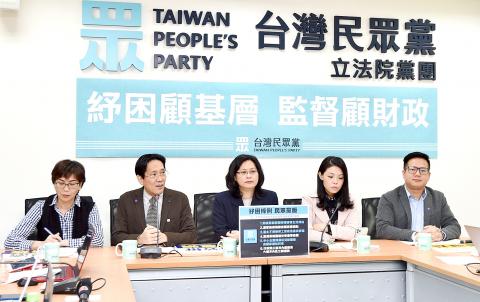Taiwan People’s Party (TPP) lawmakers yesterday unveiled their relief bill for industries affected by COVID-19 that includes a proposed fine of up to NT$450,000 (US$14,924) for employers that deny workers the right to take disease prevention leave.
Following the Executive Yuan’s plan to issue retail coupons, the TPP’s bill also includes NT$1,000 of coupons, but places limits on their use to industries and businesses deemed affected by the virus.
The funding for relief efforts and assistance programs outlined in the bill is capped at NT$110 billion — the central government’s budget surplus from fiscal years 2016 to 2019, TPP caucus whip Lai Hsiang-ling (賴香伶) said.

Photo: Peter Lo, Taipei Times
Government agencies and companies must allow employees to take time off if they are the parents or legal guardians of children younger than 12 who require care due to the virus situation, Lai said, adding that employers should not force such workers to take sick, personal or annual leave.
As caucus members have received numerous complaints from workers who were forced by their employers to take work trips to China — where several provinces and cities have been placed under level 1 and 2 alerts due to the virus outbreak — the right to refuse assignments to virus-hit regions must be set in law, she said.
Under the bill, employers would not be allowed to demand that employees work in areas under level 1 and 2 alerts.
If, after negotiations, a worker is willing to travel to such areas, the employer must report to the Ministry of Labor on a weekly basis the number of its workers in the areas, it says.
Employers must not consider employees absent without leave if they are caring for virus-affected family members or ordered to undergo quarantine, the bill says.
Employers may not deduct wages or bonuses if an employee does not take sick leave within a year, and if they do, employees can file a complaint with the ministry, it says.
The bill stipulates fines of between NT$20,000 and NT$300,000 for employers that refuse to allow workers to take leave due to the virus situation.
Ministry officials can reduce or increase the fine by up to half of the total amount depending on the number of people involved and the scope of infractions, meaning a maximum fine of NT$450,000, it says.
Workers who take leave due to the crisis and do not receive wages or stipends for assignments can apply with the ministry or another designated government agency for a living allowance, the bill says, adding that if they are in home quarantine, they would be eligible for compensation.
The bill stipulates the living allowance as 60 percent of the previous year’s average of all workers insured under the mandatory labor insurance program, while quarantine compensation would be determined by the Ministry of Health and Welfare, but should be no less than NT$600 per day.
The bill also calls for central government agencies to provide economic relief for small and medium-sized enterprises, including loan extensions of up to three months, or one year in the case of working capital loans, with the agreement of banks.
The bill’s relief and assistance programs would be in effect from March 1 to Dec. 31, Lai said, adding that the legislature could vote to extend that period.
The Executive Yuan should provide a report on execution of the programs and budgetary items after the first three months, and the premier should give an oral presentation at a legislative question-and-answer session after six months, she said.

An essay competition jointly organized by a local writing society and a publisher affiliated with the Chinese Communist Party (CCP) might have contravened the Act Governing Relations Between the People of the Taiwan Area and the Mainland Area (臺灣地區與大陸地區人民關係條例), the Mainland Affairs Council (MAC) said on Thursday. “In this case, the partner organization is clearly an agency under the CCP’s Fujian Provincial Committee,” MAC Deputy Minister and spokesperson Liang Wen-chieh (梁文傑) said at a news briefing in Taipei. “It also involves bringing Taiwanese students to China with all-expenses-paid arrangements to attend award ceremonies and camps,” Liang said. Those two “characteristics” are typically sufficient

A magnitude 5.9 earthquake that struck about 33km off the coast of Hualien City was the "main shock" in a series of quakes in the area, with aftershocks expected over the next three days, the Central Weather Administration (CWA) said yesterday. Prior to the magnitude 5.9 quake shaking most of Taiwan at 6:53pm yesterday, six other earthquakes stronger than a magnitude of 4, starting with a magnitude 5.5 quake at 6:09pm, occurred in the area. CWA Seismological Center Director Wu Chien-fu (吳健富) confirmed that the quakes were all part of the same series and that the magnitude 5.5 temblor was

The brilliant blue waters, thick foliage and bucolic atmosphere on this seemingly idyllic archipelago deep in the Pacific Ocean belie the key role it now plays in a titanic geopolitical struggle. Palau is again on the front line as China, and the US and its allies prepare their forces in an intensifying contest for control over the Asia-Pacific region. The democratic nation of just 17,000 people hosts US-controlled airstrips and soon-to-be-completed radar installations that the US military describes as “critical” to monitoring vast swathes of water and airspace. It is also a key piece of the second island chain, a string of

The Central Weather Administration has issued a heat alert for southeastern Taiwan, warning of temperatures as high as 36°C today, while alerting some coastal areas of strong winds later in the day. Kaohsiung’s Neimen District (內門) and Pingtung County’s Neipu Township (內埔) are under an orange heat alert, which warns of temperatures as high as 36°C for three consecutive days, the CWA said, citing southwest winds. The heat would also extend to Tainan’s Nansi (楠西) and Yujing (玉井) districts, as well as Pingtung’s Gaoshu (高樹), Yanpu (鹽埔) and Majia (瑪家) townships, it said, forecasting highs of up to 36°C in those areas